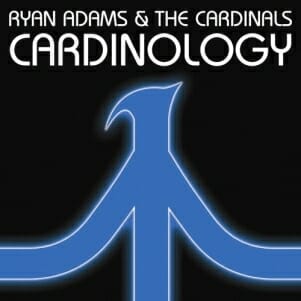
Uneven self-help record leaves listeners undernourished
I’ve never understood the fuss over Ryan Adams’ prolificacy. Each of his nine previous albums has its own distinct identity, from his 2000 solo debut Heartbreaker to last year’s Easy Tiger, and music fans are far richer having had the opportunity to see so many sides of Adams; to be able to sample so many varied sounds to love or hate.
But Cardinology is such an unremarkable album that it’s hard to fall passionately on either side, which is strange considering how Adams’ work has always inspired such fiery responses. Perhaps it’s the album’s unhurried, cruise-control-at-55 vibe. Or maybe it’s knowing how good the Cardinals are live, and realizing they weren’t able to harness the lighting-voltage of their concerts. But this hasn’t been a problem for the band in the past—they’ve already released a string of excellent albums. Another possible explanation is Adams’ professed distaste for art meant to provoke a reaction. Maybe in trying to adhere to this principle—to do something pure and without intention—he wound up making an uncharacteristically bland record.
Two summers ago, I spent a couple days interviewing Adams in L.A. He was in a much better place than he’d been in years—sober, healthier, more at peace. After all of his wounds (insomnia, drug addiction, heartbreak)—some self-inflicted, some beyond his control—anyone with a beating heart can rejoice in the progress he’s made in his personal life. He has an undeniable chemistry with his current bandmates, both musically and as friends, and they have fun together, which is important. Strangely, this doesn’t translate to the reserved Cardinology.
The album gets off on the wrong foot with “Born Into A Light.” The song’s AA-style surrender might be cathartic for Adams, but its chorus lacks gravity. Not that there’s anything wrong with Adams’ message—“For every one alone, I wish you faith and hope, and all the strength to cope, to be your own best friend, ?have confidence and keep the faith,” but it sounds too much like self-help literature and not enough like a moving piece of art.
Great authors, songwriters, painters and filmmakers don’t offer simple step-by-step solutions; they capture the human experience in all of its beauty and ugliness. And this is what I expect from Adams. Unfortunately, “Born Into A Light” frames Cardinology in New Age-y platitudes.
The lyrics on the album’s first half are so straightforward, unadorned and bereft of metaphor that they lack punch. This approach can work, but far more often, clever wordplay and poetics written around simple, easily relatable situations give a song its hair-raising impact, snapping your trance and cutting to your soul. “My God,” you think, “I get exactly what he’s singing about, and he understands exactly how I feel.” Adams has always excelled at providing this fleeting moment of connectedness, to a stranger, and thus to humanity; that beautiful instant we’re no longer locked inside ourselves.
Things begin to blossom at ?Cardinology’s midpoint—the less instructive, more impressionistic “Crossed Out Name.” “Show, don’t-tell” is a phrase that’s been beaten into the ground, but it’s worth repeating. Adams is far better when he lets listeners glimpse evocative scenes than when he’s being didactic. ?“Natural Ghost” is a confessional piece tackling insecurity in a subtle, moving way that’s mirrored by Jon Graboff’s cascading pedal steel. Standout track “Sink Ships” features the album’s most memorable, well-constructed lyric (“my mind is open now, like a door to an empty room”), revealing an extra layer of meaning by thoughtfully playing on a tired cliché. Whispered ballad “Evergreen” shuffles along dreamily with acoustic fingerpicking and soft, steady brush strokes from drummer Brad ?Pemberton.
The album wraps with “Stop,” a classic Adams piano ballad—so exhausted it can barely keep its head up. But the song has a sleepy charm; the overly simple lyrics plaguing the record’s first half work better in this setting. Slowly, strings fade in, and Adams delivers with sincerity.
With a few exceptions, though, even Cardinology’s most solid material lacks the arresting emotional intensity of past tunes like “Hard Way to Fall” or “Two,” and it doesn’t achieve the gorgeous moodiness of “The End” or “Easy Plateau,” or the enthralling storytelling of “Carolina Rain.” But if this album is a misstep, it’s a minor one with more than a few ?moments of redemption—the latest missive from a talented group of musicians likely to find their way back to the path before long.
Listen to “Fix It” from Cardinology on Ryan Adams’ MySpace page